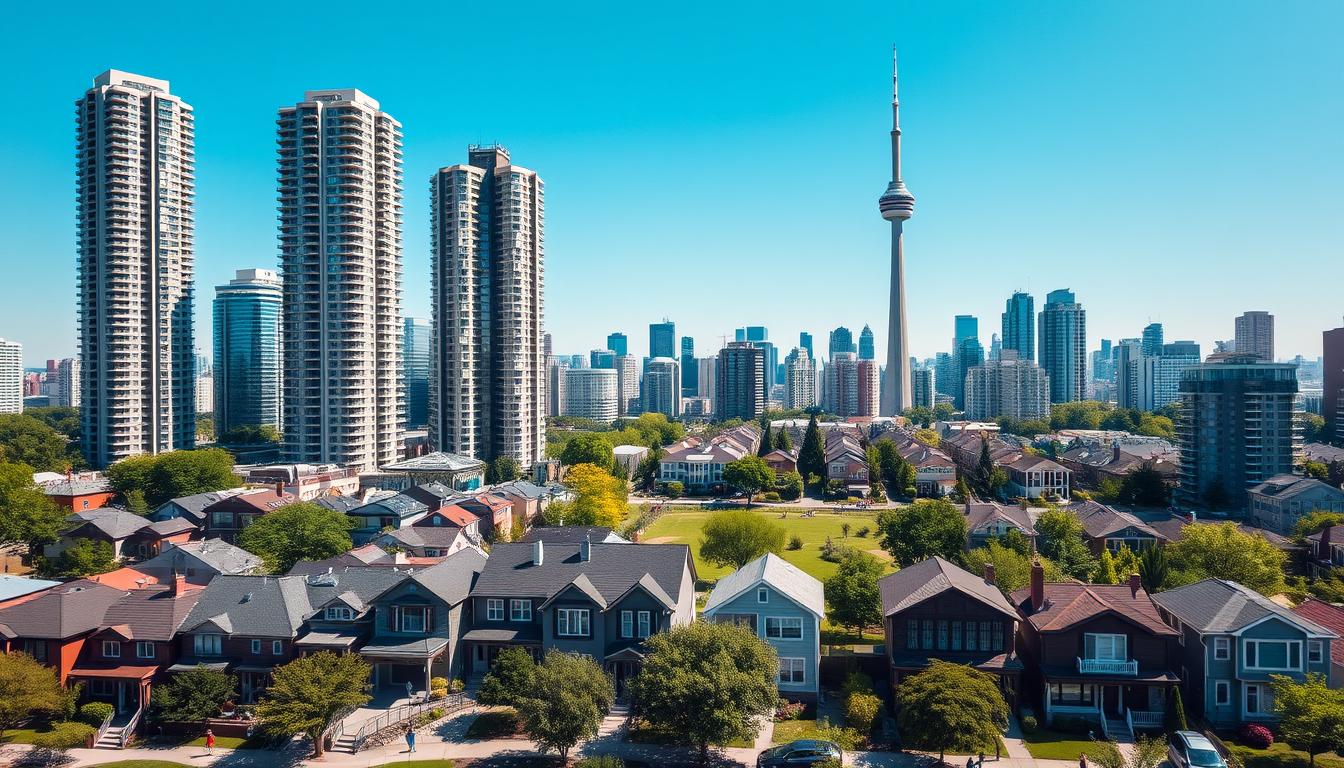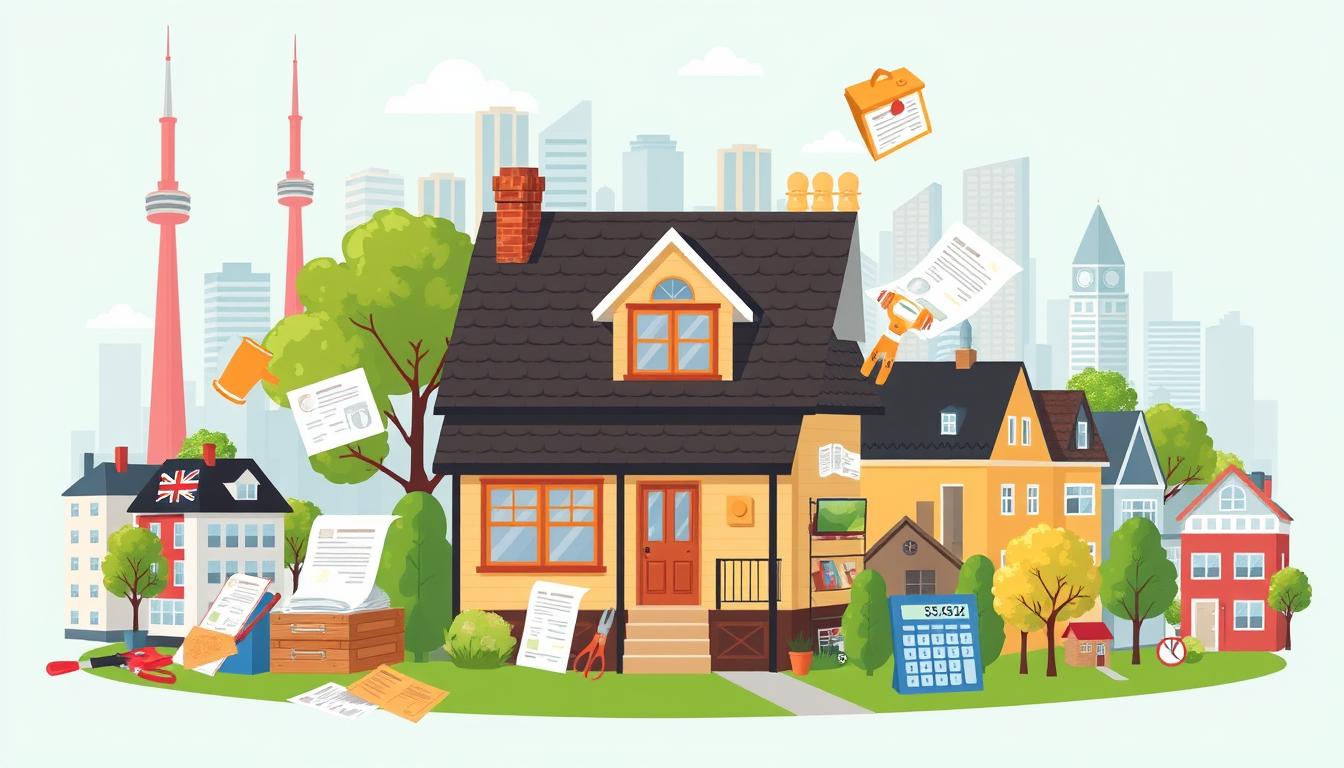In Toronto’s real estate world, the debate between renting and buying is big. The city’s housing market keeps changing, making this choice harder. You need to think about many things, like the market, costs, and benefits of each option.
Whether you’re new to buying or have done it before, knowing the market and costs is key. This knowledge helps you choose what’s best for you now and in the future.

When deciding, it’s important to understand Toronto’s housing market. You should also think about the money side of renting and buying. And don’t forget to consider what you really need and want.
This article is here to guide you through this big decision. It’s all about helping you pick the right path for you in Toronto.
The Current State of Toronto’s Real Estate Market
Toronto’s real estate market has seen a lot of interest lately. Housing prices have hit new highs, making it hard for many to buy. As Canada’s biggest city, Toronto’s market affects the whole country.
Market Trends and Price Analysis
The average price of a detached home in Toronto has gone over $1.3 million. This is a 20% jump in just one year. Toronto housing prices keep going up, thanks to a few key factors.
Impact of Economic Factors
The real estate trends in Toronto are linked to the economy. The city’s strong job market, growing population, and investment activity drive demand. But, the COVID-19 pandemic has added some uncertainty to neighbourhood property values.
Neighbourhood Price Variations
While Toronto housing prices are rising, different areas are growing at different rates. Areas like Rosedale and The Annex are seeing big price jumps. But, Scarborough and Etobicoke are growing slower.
| Neighbourhood | Average Home Price | Price Change (1 year) |
| Rosedale | $3,200,000 | +15% |
| The Annex | $2,800,000 | +12% |
| Scarborough | $800,000 | +8% |
| Etobicoke | $900,000 | +9% |
It’s important to understand the details of Toronto’s real estate market. This knowledge helps both homebuyers and investors as they move through the changing market.

Understanding the True Costs of Home Ownership
Buying a home is a big financial step. It’s key to know all the costs, not just the mortgage payments. Toronto’s housing market changes a lot. Homebuyers must understand the many costs of owning a property.
The mortgage payment is a big part of owning a home. It covers the principal, interest, and fees. But there’s more. Property taxes, utilities, and property maintenance costs also add up. They can take a big chunk of your budget.
| Expense | Average Cost in Toronto |
| Mortgage Payment (based on $600,000 home) | $2,500 – $3,000 per month |
| Property Taxes | $3,000 – $6,000 per year |
| Home Insurance | $1,000 – $2,000 per year |
| Utilities (electricity, gas, water) | $200 – $500 per month |
| Maintenance and Repairs | 1% – 4% of home value per year |
Homeowners in Toronto might also face unexpected costs. These can include big repairs or new appliances. These surprises can hurt your finances if you’re not ready.
Thinking about moving from renting to buying? You must look at all the homeownership expenses. Make sure the costs fit your budget and long-term plans.

The Financial Benefits of Renting in Toronto
In Toronto, choosing between renting and buying a home is tough. But renting has many financial perks. It offers lower costs and chances to invest, making it a good choice for many.
Flexibility and Lower Initial Costs
Renting gives you more freedom than owning a home. You can easily move without the stress of selling a property. Also, the costs to start renting are much lower than buying a home. This lets you save money and look into investment opportunities for better returns.
Investment Alternatives for Renters
Instead of a down payment, you can invest in stocks, bonds, or mutual funds. These investment opportunities might grow your money more over time. They help diversify your portfolio and improve your financial health.
Maintenance Cost Savings
Renting also saves you money on maintenance and repairs. As a renter, you don’t have to worry about property upkeep. This cost savings is huge in Toronto, where property values and upkeep costs are high.
Thinking about the financial benefits of renting can help you make a smart choice in Toronto. It offers flexibility, investment chances, and savings on maintenance. Renting can be a wise financial move for many people in the city.
Down Payment Requirements and Mortgage Options
Buying a home in Toronto means you need to think about the down payment. Usually, buyers must pay at least 5% of the home’s price. But, if you put down less than 20%, you might need mortgage default insurance. This extra cost goes into your monthly payments.
First-time buyers have some Toronto mortgage rates and down payment options to help. The Government of Canada’s First-Time Home Buyer Incentive can give you up to 10% of the price of a new home or 5% for an existing one, interest-free. Also, the Home Buyers’ Plan lets you take up to $35,000 from your RRSP for a down payment.
| Mortgage Option | Down Payment Requirement | Advantages |
| Conventional Mortgage | 20% or more | – No mortgage default insurance required- Lower interest rates |
| CMHC-Insured Mortgage | 5% to 19.99% | – Lower down payment required- Access to a wider range of lenders |
| First-Time Home Buyer Incentive | 5% to 10% | – Interest-free down payment assistance- Reduces monthly mortgage payments |
When looking at the Toronto real estate market, it’s key to know your mortgage and down payment options. Understanding these can help you make a choice that fits your financial plans and the Toronto housing market.
“The key to a successful home purchase in Toronto is to thoroughly research and understand the various financing options available to you. Explore first-time homebuyer programs and work closely with a mortgage specialist to find the best fit for your unique situation.”
Renting vs. Buying: Which is Right for You in Toronto
Choosing between renting and buying a home in Toronto is a big decision. It’s important to think about your money, lifestyle, and future plans. By looking at these things, you can pick what’s best for you.
Personal Financial Assessment
First, check your money situation. Look at your income, savings, and debts. See if you can afford a down payment, mortgage, and other home costs. This will help you decide if buying a home is right for you.
Lifestyle Considerations
- Think about what you need now and in the future. Do you like the freedom of renting or the security of owning a home?
- Consider your plans, like starting a family or moving for work. Renting might be more flexible, while owning can be more stable.
Long-term Financial Goals
Think about your financial goals, like growing your wealth or staying financially free. Owning a home can be a big asset, but it also means big responsibilities. Renting might let you explore other financial options that fit your lifestyle better.
By carefully thinking about these points, you can make a choice that fits your financial needs and future dreams in Toronto.
Property Tax and Insurance Considerations
When deciding between renting and buying a home in Toronto, think about property tax and insurance. These costs can greatly affect your housing expenses. It’s important to evaluate them carefully.
Homeowners in Toronto must pay Toronto property taxes. These taxes depend on your property’s value. Research the typical rates in your area to estimate this cost.
Homeowners also need to budget for home insurance. It protects your home from unexpected events like fire or theft. The cost varies based on your home’s age and condition, and the coverage you choose.
Renters in Toronto don’t pay property taxes but still need renter’s insurance. This policy covers your belongings and provides liability coverage. Renter’s insurance is cheaper than homeowner’s insurance but still important for your budget.
| Expense | Homeowners | Renters |
| Toronto Property Taxes | ✓ | – |
| Home Insurance | ✓ | – |
| Renter’s Insurance | – | ✓ |
Understanding property tax and insurance for renting and buying in Toronto helps you make a better choice. It’s about finding the best fit for your finances and future plans.
Location Factor: Where to Rent or Buy in Toronto
Location is key when renting or buying a home in Toronto. The city has many neighbourhoods, each with its own vibe and perks. This makes it easy to find the right spot for you.
Top Neighbourhoods for Buyers
Several areas are favourites among homebuyers in Toronto. The Annex is loved for its old homes and close ties to the University of Toronto. It’s perfect for young families and professionals.
Leslieville is another hit, thanks to its lively arts scene and local shops. It’s ideal for those who want city life but also a strong community feel.
Best Areas for Renters
The rental market in Toronto is varied, with many areas suited for renters. Downtown is a top pick for its easy access to public transport and city amenities. It’s great for young professionals and students.
Parkdale is known for its artistic vibe and affordable living. It’s perfect for those who prefer a more relaxed, community-focused lifestyle.
Transportation and Amenities
- Good public transport is crucial in Toronto. Areas like Yonge-Eglinton and Bloor-Yorkville are well-connected. They make commuting easy and reduce the need for cars.
- Having access to amenities like shops, restaurants, and gyms is also important. Places like Queen West and King West have lively commercial areas. They meet the needs of many residents.
Choosing to rent or buy in Toronto depends on your personal needs and budget. By exploring the different Toronto neighbourhoods, you can find the best fit for your lifestyle.
Building Equity vs. Financial Freedom
Choosing between renting and buying a home in Toronto is complex. You must consider building home equity versus the financial flexibility of renting. Each choice has its own benefits and long-term effects on wealth building.
Buying a home is seen as a way to build wealth through equity. As you pay down your mortgage, you’re investing in an asset that may grow in value. This is a solid strategy for wealth building over time. Yet, it demands a big down payment and ongoing maintenance costs.
Renting, however, offers more financial flexibility. It often means lower initial costs and the chance to use your money elsewhere. This is great for those who want to move easily or invest in other assets like stocks.
| Metric | Buying a Home | Renting |
| Initial Costs | High (Down Payment) | Low (Security Deposit) |
| Ongoing Expenses | Mortgage, Property Taxes, Maintenance | Monthly Rent |
| Asset Appreciation | Potential for Equity Growth | No Equity Buildup |
| Flexibility | Limited (Tied to the Property) | High (Ability to Move) |
The choice between home equity and financial flexibility depends on your financial goals and lifestyle. It’s crucial to consider the pros and cons of each option. This will help you find the best choice for your situation.
“The decision to rent or buy a home in Toronto should be based on a thorough understanding of your financial situation and long-term goals.”
First-Time Home Buyer Programs in Toronto
Buying your first home is exciting but can feel overwhelming, especially in Toronto’s competitive market. Luckily, the Canadian government has many incentives and programs to help. These make buying your first home more accessible.
Government Incentives
The Home Buyers’ Plan (HBP) is a well-known program. It lets you take up to $35,000 from your RRSP for a down payment. You have 15 years to pay it back, which can help a lot.
The First-Time Home Buyer Incentive is another great option. It’s a shared-equity mortgage that gives up to 10% of the home’s price. This can make your mortgage and monthly payments smaller, helping you own a home sooner.
Eligibility Requirements
To get these benefits, you need to meet some rules. You must be a Canadian citizen or permanent resident. You can’t have owned a home in the last four years. Also, your household income can’t be over $120,000 for the First-Time Home Buyer Incentive. Knowing what each program requires is key.
Application Process
- Gather all necessary documents, like proof of income and residency, and a pre-approval letter.
- Apply for the program you want, either on the CMHC website or through your lender.
- Wait for approval, which can take a few weeks.
- Finish buying your home and make sure you meet the program’s needs.
Looking into these incentives and programs is a big step towards owning a home in Toronto.
The Hidden Costs of Both Options
Choosing between renting and buying a home in Toronto isn’t just about the upfront costs. Both paths have hidden expenses that can surprise you. Let’s look at these costs to help you decide wisely.
Unexpected Expenses for Homeowners
Homeowners face many unexpected costs. These can range from fixing a leaky faucet to replacing the roof. These unexpected expenses can cost thousands. Property taxes and insurance also change, making budgeting hard.
Rental Increases and Fees for Tenants
Renters often see rental increases over time. This can strain their budgets. Landlords may also charge extra fees, like pet deposits or move-in fees. These hidden costs can make renting pricier than expected.
| Homeowner Costs | Renter Costs |
| Home Maintenance– Repairs- Appliance Replacements- Roof/Siding Replacements | Rental Increases– Annual Rent Hikes- Fees for Pets or Damages |
| Property Taxes– Can Fluctuate Annually | Security Deposits– Upfront Costs for Moving |
| Homeowner’s Insurance– Premiums Can Increase | Moving Expenses– Truck Rentals- Packing Supplies |
Whether renting or buying, consider these hidden costs. This way, you can choose what’s best for your finances and future. Knowing all the details helps you avoid surprises.
“The devil is in the details,” as they say. Being aware of the hidden costs of renting and buying in Toronto helps you make a better choice. It ensures your choice fits your budget and lifestyle.
Market Timing and Future Projections
When deciding to rent or buy in Toronto’s real estate market, timing is key. The market’s changes can greatly affect your financial future and the value of your investment. Knowing the market forecast and expected property value trends helps you make a smart choice that fits your investment goals.
Right now, Toronto’s real estate market is growing at a steady pace. Experts predict prices will keep going up in the next few years. This trend is good for those wanting to invest in property, but remember, the market can change due to economic factors.
Thinking about market timing is important in your decision. You might want to take advantage of today’s market or wait for better conditions. Knowing the market’s future trends helps you choose wisely, balancing your financial goals with the market’s potential.
FAQ
What are the key considerations when deciding between renting and buying a home in Toronto?
Choosing between renting and buying in Toronto depends on your financial situation and lifestyle. You should think about the real estate market, upfront costs, and monthly expenses. Also, consider your flexibility and the chance to build equity.
How has the COVID-19 pandemic impacted Toronto’s real estate market?
The COVID-19 pandemic has changed Toronto’s real estate market. Some areas have seen price drops, while others have seen increases. Interest rates and employment levels have also played a role.
What are the true costs of homeownership in Toronto?
Homeownership in Toronto means more than just mortgage payments. You’ll also pay property taxes, insurance, maintenance, and might face unexpected repairs. Knowing these costs is key to budgeting for a home.
What are the financial benefits of renting in Toronto?
Renting in Toronto can save you money upfront and offer flexibility. You won’t have to worry about maintenance and repairs. Plus, you can invest the money you’d spend on a down payment.
What are the typical down payment requirements and mortgage options for buying a home in Toronto?
Down payments for homes in Toronto range from 5% to 20% of the home’s value. There are different mortgage options, like conventional and high-ratio mortgages, to help you buy a home.
How do property taxes and insurance affect the renting vs. buying decision in Toronto?
Homeowners in Toronto pay property taxes and insurance, which can increase costs. Renters usually only pay for renter’s insurance, which is cheaper.
What are the best neighbourhoods for renters and buyers in Toronto?
The best neighbourhoods for renting or buying in Toronto depend on what you value. Renters might prefer affordable areas, while buyers might look for places with high property values and growth potential.
What are the hidden costs associated with renting and buying in Toronto?
Renting in Toronto can come with unexpected costs like rent hikes or security deposits. Homeowners might face surprise maintenance and repair bills that can affect their budget.
How can first-time homebuyers in Toronto take advantage of government incentives and programs?
The Canadian and Ontario governments offer help for first-time homebuyers in Toronto. This includes the First-Time Home Buyer Incentive and the Home Buyer’s Plan. Each program has its own rules and application process.
What is the current market forecast for Toronto’s real estate market, and how might it impact the renting vs. buying decision?
Toronto’s real estate market has seen big price jumps lately, and it’s expected to keep growing but at a slower pace. The decision to rent or buy can be influenced by these trends. Buyers might want to act before prices go up more, while renters might wait for a market correction.
Your Trusted Real Estate Agent in Toronto
Looking for expert assistance to buy or sell your property in Toronto? Contact us today to work with a professional real estate agent who knows the market inside and out!
Get in TouchBusiness Contact Details
- Address: 305 Milner Ave Unit # 312, Toronto, ON M1B 3V4, Canada. Get Direction - Google Map
- Contact Name: Sivage Sivagumaran
- Phone: +1 416-553-8902
- Email: sivagehomes@sivage.ca
Visit our website at SivageRealty.ca for the latest property listings and personalized services. Let us help you turn your real estate goals into reality. Your dream property is just a call away!
Disclaimer:
The content provided in this blog is for informational purposes only. We recommend consulting with a qualified professional before making any decisions based on the information provided. If you have any questions or concerns, please don't hesitate to reach out to us. Our contact information is available on the Contact page.




